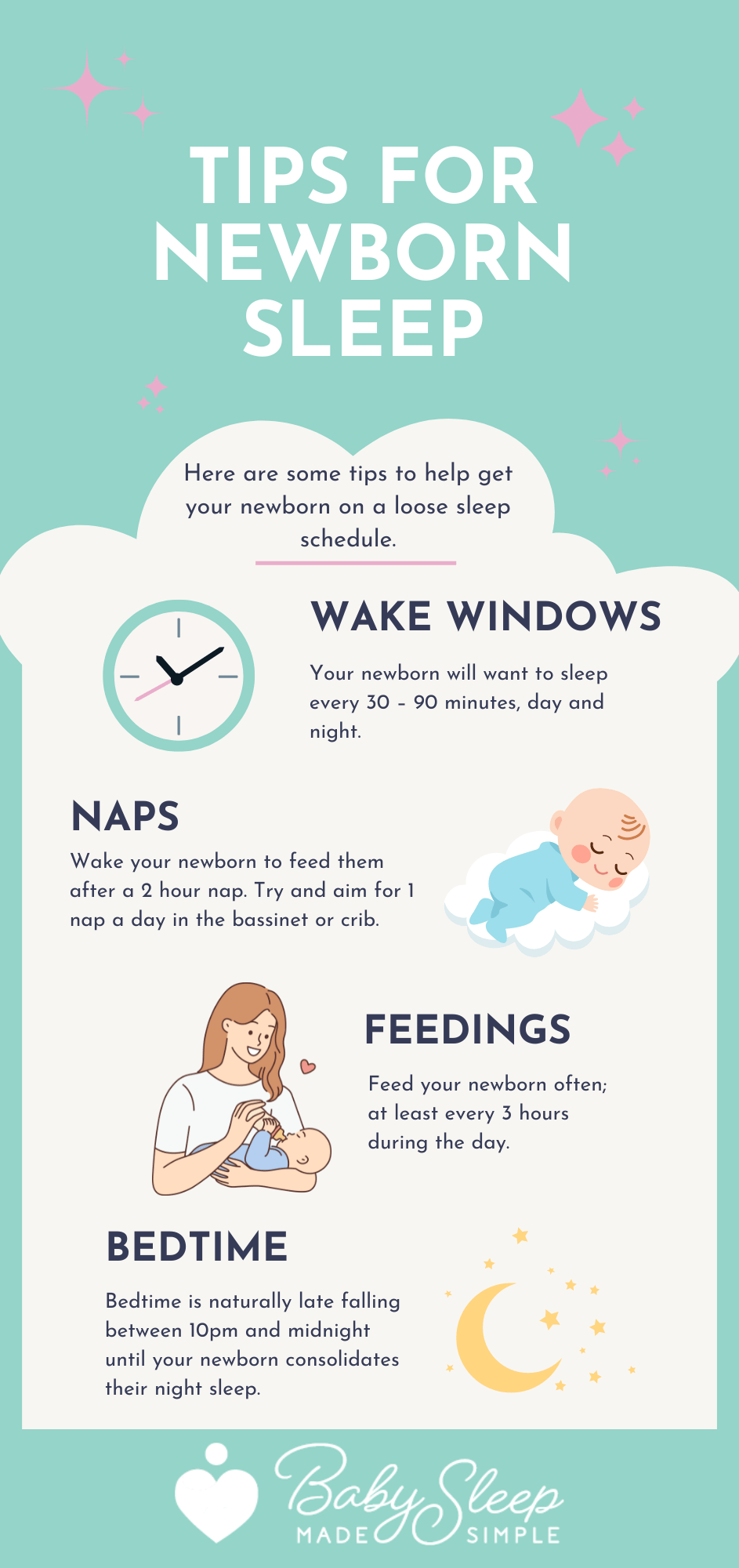Congratulations! Your newborn has arrived and you’ve been getting to know each other for a few days or weeks now. You love the way he feels and smells. In fact, everything about him is adorable. But everything might also seem a bit scary. Especially how to get your newborn on a sleep schedule. (And whether he even needs one!)
The questions are endless, because everything is new! Don’t worry, mama. I got you covered.
The truth is that your newborn won’t have consistent sleep patterns like older babies. He’s not developmentally ready for that just yet. But there’s plenty you can do to help your baby sleep well.
This article will give you all the essential tips and tricks to get your newborn baby sleeping well, day and night.
This post may contain affiliate links.
Table of Contents:
- Newborn Sleep Schedule – What to Expect
- Newborn Sleep Tips
- Wake Windows
- Naps
- Feedings
- Night Wakings
- Total Sleep in 24 hours
- Bedtime
- Can I prevent SIDS?
- FAQs
I’m creating a Newborn Sleep Course. Click here and let me know what you’d like it to include.
x
Newborn sleep schedule – What to expect
For newborns, sleep is pretty unpredictable. That’s the unfortunate truth. Your newborn’s body clock hasn’t developed, so he doesn’t understand the difference between day and night yet. It’s also normal for some of his sleep stretches to be long, and others short.
In a time filled with such uncertainty, one thing’s for sure. Starting your newborn on a loose schedule (or routine) will help both of you get the rest you need so this phase can go easier.
Routines give parents peace of mind. Let me explain- once your baby is on a fairly consistent daily routine you’ll know how to decipher his cries. If he recently ate but is fussy, he must be tired or gassy. If he recently slept, you’ll know he’s hungry, etc…
The best way to help your newborn fall into a predictable sleep schedule (as soon as he’s developmentally ready) is to follow the tips from this article.
For more advice on nighttime sleep, check out my article on how to get a newborn to sleep at night.
Newborn Sleep Tips
Wake Windows
Newborns can’t handle being awake for long periods of time. The world is full of new sounds, lights and stimulation, and your baby’s brain needs to “shut down” often during the day. Otherwise, your baby runs the risk of getting overstimulated, which can make him fussy and hard to settle. He can only handle the world in “small doses” at this point.
Your newborn will want to sleep every 30 – 90 minutes, day and night. It’s perfectly normal for your baby to stay awake only long enough to feed, change a diaper and play a few minutes. Allow your baby to rest as often as he wants.
If your newborn gets fussy and the usual tactics aren’t working (like feeding, changing him and soothing) try taking him to the bedroom to settle. Bounce or walk him around the room. Babies often need us to help them “shut down” and go to sleep. They can’t always do it on their own.
Also, when you find yourself with a wide awake baby in the night, try not to worry. Remind yourself that he’ll sleep again in the next 30 – 90 minutes (and so will you.)
Naps
Short and unpredictable naps are common in the newborn phase. Consider yourself warned! It’s perfectly normal for your newborn to take a 20 minute nap and then a 2 hour nap.
Let your newborn nap in the stroller (flat, not upright), carrier, or your arms if it helps her nap well. Just make sure all naps outside the crib or bassinet are supervised by an awake adult.
Also try to have your newborn nap in her crib or bassinet at least once each day, to get her used to it. (You can try more often if you want, too.) But if you find that your newborn will only sleep when held during these first few weeks, that’s fine.
You don’t need to stress about forming negative long-term sleep habits at this point. Just do whatever works, as long as your baby is safe.
Remember, the most important thing is to let your baby sleep often. When she starts to get fussy it’s probably because she’s hungry or tired. Change her diaper, give her a feed, and put her down for a nap. (Then feed yourself and rest!)
I recommend you wake your newborn and feed her once a nap has reached 2 hours. This will help set her body clock as she grows. You’re slowly showing her body that daytime is for eating, being awake and taking naps. And nighttime is for sleeping. (More details on “day/night confusion” below.)
Feedings
Your newborn will want to feed every 2-4 hours, day and night. In these first few weeks, your baby’s nutrition should take priority over his sleep (and everything else.)
What’s most important is making sure your baby is eating well (and breastfeeding is getting established, if applicable.)
The best way to determine if your baby is eating enough is if he seems happy between feeds, has at least 6-8 wet diapers everyday and is gaining weight as expected.
Don’t allow more than 3 hours between feedings during the day. Wake your newborn from a nap to feed him. If he’s difficult to wake try undressing him, tickling his feet, and talking to him.
You don’t want your newborn to have a 5 hour stretch between feeds during the day. You want this to happen at night!
Night Wakings
Your newborn doesn’t yet understand the difference between day and night. This means you’ll find yourself “hanging out” with your little cutie at 3 am. It’s par for the course.
There really isn’t a set number of night feedings that we can work toward just yet. Remember, your baby should feed every 2-4 hours around the clock. You can ask your pediatrician if you need to wake your baby at night to feed or if it’s ok for him to sleep as long as he wants.
Total Sleep in 24 Hours
Newborn babies typically sleep 14 – 18 hours each day. This sounds like so much! “Why am I so tired, then?” you might be thinking.
Well, although your newborn sleeps more than half of each day, her sleep will be broken. Which means your sleep will be broken, too. And that’s why you feel so exhausted. (It’s 100% normal.)
You don’t have to keep track of your newborn’s sleep patterns. I only recommend this if you’re concerned about something. The Huckleberry App is a favorite among parents for tracking sleep, feeds and lots more!
Bedtime
Bedtime for newborns is naturally late, usually falling between 10pm – midnight.
Remember, your baby doesn’t yet know the difference between night and day. We’re going to start gently teaching his body that nighttime is for sleeping and daytime is for being awake, playing, eating and napping (using the tips below.)
The first “nighttime” you want to establish for your baby should fall between midnight – 5 am.
This means you want to treat all wakings between 12 – 5 am as “night wakings” to encourage your baby to fall back asleep. Keep the room dark with minimal stimulation.
When your baby wakes, change his diaper, put his sleep sack back on and feed and burp him in the dark. Then cross your fingers and hope he falls back asleep!
Once your newborn has consolidated his first “nighttime” between midnight – 5 am, he’ll start adding hours as he grows each month. He’ll add hours in the evening and early morning, and before you know it he’ll be sleeping longer at night.

Can I prevent SIDS?
SIDS is the unexplained death of a seemingly healthy baby while sleeping. It’s one of the biggest fears of every new parent. (It’s definitely kept me awake and worried many nights when my babies were young.)
The good news is that you can reduce your baby’s risk of SIDS by more than 50% when you follow a few basic guidelines.
Remember, ABC. Your baby should sleep Alone on their Back in a Crib.
First, make sure your baby’s sleep space is safe (this article tells you how.) Then, make sure your baby always sleeps on his/her back (explained more here.)
If your baby refuses to sleep in a bassinet or crib, you need this guide.
Final Thoughts
Although it’s too early to begin formal sleep training, this article gives lots of tips for creating healthy sleep habits for your newborn.
Following this advice will help your newborn (and you) sleep better. For even more tips, get my free guide on how to get your newborn to accept the bassinet.
Are you struggling with your newborn’s sleep?
Ask me anything in the comments!
FAQs
How much sleep does a newborn need?
Newborns typically sleep 14-18 hours a day, although this is broken up over many sleeps throughout the day and night.
When do newborns start sleeping through the night?
Babies start sleeping through the night between 6-9 months old when they are developmentally ready to learn to sleep independently and have gained enough weight to no longer need night feeds.
How to establish a sleep schedule for a newborn?
Newborns are not yet ready for a strict sleep schedule, although you can start setting healthy sleep habits from the beginning. Setting a loose routine as outlined in this article will help your newborn establish a great sleep foundation.
















Hi! My 5 week old is an easy sleeper throughout most of the day, taking 1-2hour naps 4-5 times daily and with a bedtime of 7:30p and dream feed around 10:30p. This usually gives us a 4 hour stretch until 2-3 when she wakes and feeds again. After she feeds, I put her back in the bassinet and she appears to be sleeping with eyes closed, but every couple of minutes she is squirming, grunting, seemingly uncomfortable. I have considered this being just active sleep, but the minute I pick her up, she settles, so I am thinking not? I have allowed this to go on until her next feed, but of course I am not able to sleep with all of the noise, and I’m afraid she’s not getting restful sleep either. Any guidance on this would be much appreciated!
Hi Taylor! Thanks for your question. At 5-weeks old, sleep is still very disorganized and unpredictable, that’s totally normal. The fact that you’re seeing so much good sleep during the daytime and longer stretches at night is AMAZING! Does she have issues with gas that could be causing the squirming and grunting? When you pick her up, does she burp, or is she more comfortable because she’s not lying flat and is elevated when you pick her up? Babies are loud sleepers, so I would definitely encourage white noise while she is sleeping- this will help your sleep, too!
Please let us know if you have any additional questions 🙂
Best,
Ingrid, BSMS Support Team
Hi. I was early to introduce my newborn to heathy sleep habits and avoid sleep associations, and everything seemed to work out fine, until she was about 4 weeks old. At that time she started to fuss both at day and night and refused to sleep on her back in her crib. It got worse and worse, at the end the only thing that helped was to wear her. Now she is almost 6 weeks old and doesnt seem to want to sleep in her crib again. I do everthing I should at bed/nap time: dark room, noise machine, swaddle. I’ve tried putting her in the crib awake, drowsy, patting/shushing/rocking her before I lay her down or while she lays in the crib. I made sure that she is fed, burped, changed and stimulated during wake times and have appropriate wake windows. But nothing seems to work, she only wakes up after a few minutes in her crib, and almost sleeps immedietly everytime I pick her up. Should I continue to try to have her sleep in the crib again even if I will cost her the amount of sleep the next few days? Should I just let her cry it out in her crib? How should I continue with this?
Hello and thank you for your post! It is completely normal for LOs at this age to need help falling asleep since they are still in the “fourth trimester”. It is okay to rock your LO or help your LO fall asleep at this age. We really see babies become able to fall asleep independently around 5/6 months. Don’t overly stress about sleep associations at this early stage! 🙂 Alyssa, BSMS Support Team
My 7 week old boy has been taking his longest stretch of sleep starting at 7:30pm/8:00pm. Is there a way I can help move this bedtime later so he’s not waking up ready for the day around 5:30am every day?
Hi Lauren,
Thanks so much for your message and congratulations on your newest addition! Since your LO is still in that “fourth trimester” it is completely normal to not have a solid schedule. There is so much growth and development and it can be tough for LO’s. This is one of the reasons why babies nap so much during the day. You can try to push back bedtime later by gradually moving it back every 10 minutes over 3 days. Just don’t stress if your LO still has trouble given his age. We often see LO’s do better with a more solid schedule around 5/6 months! Alyssa, BSMS Support Team
My 2 And a half month old has now gone back to waking every 3 hours to feed again, he was close to sleeping 8 hours a night. Any suggestions on how to get him to sleep longer at night again?
Hi Casey! Thanks for your comment! It always tough when sleep is good and suddenly derails! Luckily it is usually due to a developmental stage that passes 🙂 Since you are between two guides, I’ll link both of them for you. The guides will help you with sleep problems and help manage expectations on sleep at this stage.
Here is the 2 month old guide: https://www.babysleepmadesimple.com/how-to-help-2-month-old-baby-sleep-well
Here is the 3 month old guide: https://www.babysleepmadesimple.com/3-month-old-sleep-problems
If you implement the tips consistently for 2 weeks, you should see improvements 🙂
Hope it helps! / Leena, BSMS Support Team
Hi I am a mum of twin boys now age 4 months (corrected 8 weeks old as born at 29 weeks). Would you advice using your methods with twins or any adaptations? Thanks
Hi Jacqui, thanks for your question!
Congratulations on your two boys!
I will link our 2 month old guide to see what challenges or actions that might be of help.
https://www.babysleepmadesimple.com/how-to-help-2-month-old-baby-sleep-well
When working with twins, we still make sure that we go by their adjusted age, individual personality and your parenting preference. Most moms that we work with choose to work on both babies’ sleep at the same time. Of course, it helps to have a supportive partner too. Once your babies are 5 months old and if you’re considering sleep training them, you can contact us for recommendations about sleep training twins.
Hope this helps! / Leena, BSMS Support Team
Hi Jilly,
I have a 5 week old who fights sleep, especially during the day. He will only nap once or twice – sometimes for 30 minutes or 2 hours but generally no more. We regularly attempt naps and although his eyes will get heavy and he appears to be starting to fall asleep, he will wake himself up and then refuse to fall into a sleep. He is very fussy throughout the day, likely because he is overtired. We do swaddle him and although it cuts down on him jerking himself awake once asleep, it doesn’t seem to help get him to sleep. Even with reduced stimuli, he still fights sleep and I struggle trying to get him to sleep! Any suggestions?
Hi Hilary!
It can be so tiring having a baby that wants to sleep, but can’t. Wearing baby in a carrier facing inward toward you (and going for a walk) might help him settle easier and be able to sleep? Also lying him in the stroller and going for a walk outside can help as well. Sometimes overstimulated babies need a change of scenery to be able to unwind and relax. And many find it easy to sleep outside! If you suspect gas or tummy troubles might be bothering him, try bicycling his legs for a few minutes throughout the day or doing a few minutes of “tummy time” to relieve trapped gas. Plus LOTS of burping. And some moms swear by probiotic drops for their fussy babies (ask your doctor first.)
I hope these tips help. / Leena, BSMS Support Team
Hi Jilly,
My baby boy is 6 weeks old. He started off sleeping decently at night, waking every 2-3 hours to est then going right back to sleep. At this time he slept in the “sleeper” part of our pack and play, and even when we first transitioned him to the pack and play itself he did fine. However, in the last week and a half if I lay him on his bavk to sleep he immediately wakes up. If I wait until he is in a deep sleep before laying him down, he still wakes up. He cries and screams until I pick him up. And when I do get him to sleep, he wakes up every 30-45 minutes at night and doesnt settle himself back down. Do you have any suggestions or tips??
Hi Samantha,
I highly recommend swaddling your newborn. Swaddling works wonders for helping young babies sleep longer stretches. You can see swaddle blankets I recommend in this article above.
Also, keep an eye on his awake times during the day. If he’s awake for too long in the day, he can become overtired which makes it harder for him to settle and worsens day and night sleep. Keep his awake times always under 2 hours, all day long. (Ideally under 90 minutes.)
You can put the Pack n Play right next to your bed. That way, you’re still close to him and can shush or give hands-on soothing when he wakes but he stays in his bed.
This plus all the tips in this newborn guide should definitely help to improve his sleep.
Good luck,
Jilly